Just type your contacts
Just type your contacts
You accept the privacy policy by submitting the form.
Just type your contacts
You accept the privacy policy by submitting the form.
Cybersecurity in the Finance: Spear Phishing and Data Breaches Amidst Growing Cybercrime
Cybersecurity in the Finance: Spear Phishing and Data Breaches Amidst Growing Cybercrime
Cybersecurity in the Finance: Spear Phishing and Data Breaches Amidst Growing Cybercrime

Let's look at examples of incidents that have occurred in the Finance industry.
- Incident 1
The actual financial losses from the attack were $800,000, but the attack also damaged the hedge fund’s reputation, causing them to lose their biggest client and shut down operations.
- Incident 2
Hackers used social engineering to gain access to Robinhood's customer support systems, compromising the personal information of about 7 million customers. The attack was carried out through a phone call to a customer service employee.
- Incident 3
- Incident 4
They then used the compromised accounts to launch phishing attacks against customers and partners, exacerbating the initial breach and causing widespread concern.
What Are the Worst Consequences of a Finance Company Being Hacked Through Phishing?
What Are the Worst Consequences of a Finance Company Being Hacked Through Phishing?
1. Financial Losses: Hackers can steal funds directly from the company or its clients by gaining access to sensitive banking information, executing fraudulent transactions, or manipulating internal systems.
2. Data Breach: Personal and financial information of clients, such as account numbers, social security numbers, and credit card details, can be stolen and sold on the dark web, leading to identity theft and financial fraud.
3. Reputation Damage: Trust is paramount in finance. A hacking incident can severely damage the company's reputation, causing clients to lose confidence in the firm’s ability to protect their data. This can lead to client attrition and loss of future business.
4. Regulatory Fines: Depending on the jurisdiction, financial institutions are subject to strict regulations regarding data protection. A breach may result in hefty fines for failing to comply with these regulations, such as GDPR in Europe or CCPA in California.
5. Legal Consequences: The company may face lawsuits from affected clients, especially if it’s found negligent in its cybersecurity practices. The legal costs and potential settlements could be significant.
6. Business Disruption: A phishing attack could disrupt critical operations by locking systems or corrupting data. Recovery may take days or even weeks, leading to lost productivity and revenue.
7. Further Attacks: If hackers gain access to internal systems, they can plant malware or backdoors, enabling future attacks, including ransomware, which can further devastate the company.
2. Data Breach: Personal and financial information of clients, such as account numbers, social security numbers, and credit card details, can be stolen and sold on the dark web, leading to identity theft and financial fraud.
3. Reputation Damage: Trust is paramount in finance. A hacking incident can severely damage the company's reputation, causing clients to lose confidence in the firm’s ability to protect their data. This can lead to client attrition and loss of future business.
4. Regulatory Fines: Depending on the jurisdiction, financial institutions are subject to strict regulations regarding data protection. A breach may result in hefty fines for failing to comply with these regulations, such as GDPR in Europe or CCPA in California.
5. Legal Consequences: The company may face lawsuits from affected clients, especially if it’s found negligent in its cybersecurity practices. The legal costs and potential settlements could be significant.
6. Business Disruption: A phishing attack could disrupt critical operations by locking systems or corrupting data. Recovery may take days or even weeks, leading to lost productivity and revenue.
7. Further Attacks: If hackers gain access to internal systems, they can plant malware or backdoors, enabling future attacks, including ransomware, which can further devastate the company.
Links to cases of hacking of organizations using phishing in the Finance industry
Links to cases of hacking of organizations using phishing in the Finance industry
https://www.bluevoyant.com/knowledge-center/8-devastating-phishing-attack-examples-and-prevention-tips
https://siliconangle.com/2021/11/08/social-engineering-attack-robinhood-impacts-7m-customers/
https://marketbusinessnews.com/fake-zoom-invite-forces-levitas-capital-to-close-up-shop/254297/
https://www.doherty.co.uk/blog/two-scary-examples-of-real-world-phishing-attacks/
https://siliconangle.com/2021/11/08/social-engineering-attack-robinhood-impacts-7m-customers/
https://marketbusinessnews.com/fake-zoom-invite-forces-levitas-capital-to-close-up-shop/254297/
https://www.doherty.co.uk/blog/two-scary-examples-of-real-world-phishing-attacks/
Links with phishing threats in other industries:
Links with phishing threats in other industries:

